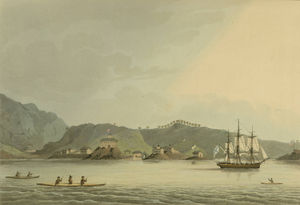Sloop-of-war: Difference between revisions
Jump to navigation
Jump to search


imported>Robert A. Estremo (add image / refs) |
imported>Robert A. Estremo m (move refs) |
||
| Line 8: | Line 8: | ||
==Notes== | ==Notes== | ||
{{reflist}} | {{reflist}} | ||
Revision as of 15:36, 2 October 2012

(PD) Painting: Yuri Feodorovich Lisyansky
The sloop-of-war Neva was the first Russian ship to circumnavigate the globe in 1804 under the command of Lieutenant Commander Yuri Lisyansky.[1] In June, 1807 she became the first Russian ship to make contact with Australia.[2]
The sloop-of-war Neva was the first Russian ship to circumnavigate the globe in 1804 under the command of Lieutenant Commander Yuri Lisyansky.[1] In June, 1807 she became the first Russian ship to make contact with Australia.[2]
A sloop-of-war is a light sailing warship, fitted with a single gun deck and light cannon, typically used for patrols and scouting where contact with larger warships was not expected. Typical armaments included 16-20 guns, but some had up to 28. Sloops were generally assumed to be "ship-rigged", with three masts and square sails, but small seagoing vessels with other rigging sometimes were grouped with the more standard sloops.
Her commanding officer was usually a commander but sometimes a junior captain. In World War Two, WWII sloops were ocean escorts, with lesser capability than a destroyer or destroyer escort.